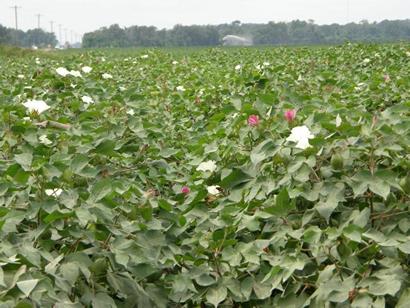The Boll Weevil. (original) (raw)
�Oh, the boll weevil is a little black bug,
come from Mexico they say,
come all the way to Texas,
just looking for a place to stay,
just looking for a home, just looking for a home.�
And the weevil, actually a beetle, found it, much to the chagrin of East Texas cotton growers.
The earliest specimens appeared in the area of Vera Cruz, Mexico, about 1840 and then moved northward. By the 1890s the migration had brought the critter as far as Corpus Christi.
Cotton Field in Bloom
TE photo
The weevil begins its life cycle light colored but darkens as it matures, and measures approximately one-four inch in length. The weevils hibernate during winter, then emerge when cotton plants are blooming and developing bolls. They burrow into the boll, consume some of it for sustenance, and then lay eggs inside the boll, which soon drops off the plant. The larvae hatch to continue the cycle; meanwhile the cotton farmer is minus one boll of cotton for each invasion. Cotton boll weevil infestation cut yields by hundreds of thousands of bales. The consequence was explained in another verse of Tex Ritter�s Song:
�Well the merchant got half the cotton,
the boll weevil got the rest,
Didn�t leave the farmer�s wife,
but one old cotton dress,
And it�s full of holes, its full of holes.�
The boll weevil reached the Sabine River by early in the twentieth century, then continued across the South. The weevil�s lack of toleration of hard freezes kept it in southern climes, but it was not susceptible to available pesticides.Texas legislators offered prizes for a solution to the weevil problem, unsuccessfully. Some suggested that farmers cease planting cotton for several years to interrupt the weevil�s cycle, hardly a suitable solution for the farmers who lacked alternative ways to make a living. Eventually calcium arsenate and fluorides offered some relief from the pest�s devastation.
�If anybody should ask you,
who it was that made this song,
Just tell him it was a poor farmer,
With a pair of blue overalls on,
Ain�t got nothome, ain�t got no home.�
� Archie P. McDonald
All Things Historical January 1, 2006 column
A syndicated column in over 40 East Texas newspapers
This column is provided as a public service by the East Texas Historical Association. Archie P. McDonald is director of the Association and author of more than 20 books on Texas.

